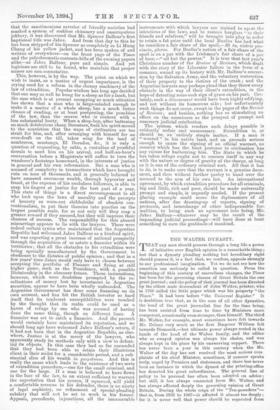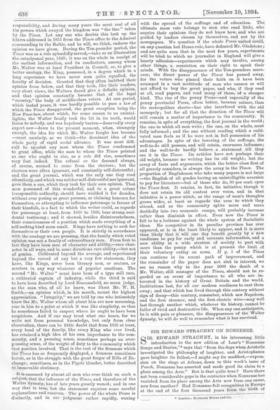THE WALTER DYNASTY. T HAT any man should possess through a
long life a power of initiative over English opinion is a remarkable thing ; but that a dynasty pleading nothing but hereditary right should possess it, is a fact that, we confess, appeals strongly to our professional imagination. Yet we do not see how the assertion can seriously be called in question. From the beginning of this century of marvellous changes, the Times has been for the governing classes of Great Britain the one great journal ; and the policy of that journal has been directed by the eldest male descendant of John Walter, printer, who in 1788 called the little paper which was his property "the Times." It had been before "the Universal .Register." It is doubtless true that, as in the case of all other dynasties, the head of the great journalist line for the time being, has been assisted from time to time by Ministers more competent, occasionally even stronger, than himself. The third Mr. Walter, for example, must sometimes have felt towards Mr. Delano very much as the first Emperor William felt towards Bismarck,—but ultimate power always rested in the hands of the head of the Walter family, and the editor who so swayed opinion was always his choice, and was always kept in his place by his unswerving support. There has never been a year in this century when the Mr. Walter of the day has not received the most serious corn plaints of his chief Minister, sometimes, if rumour speaks truly, urged by Premiers and statesmen, and there has never been an instance in which the dynast of the printing-office has deserted his great subordinates. The general line of policy to be pursued has often been adopted on advice; but still, it has always emanated from Mr. Walter, and has always affected deeply the governing opinion of Great Britain. Daring the whole reign of the " Ten-pounders that is, from 1832 to 1867--,it affected it almost too deeply ; for it is never well that power should be separated from
responsibility, and during many years the most real of all the powers which swayed the kingdom was "the line" taken
by the Times. Let any one who doubts this look up the letters addressed in 1855 from the Times office to the Admiral commanding in the Baltic, and he will, we think, endorse the opinion we have given. During the Ten-pounder period, the Times was as a rule splendidly served,—take as an illustration the cataclysmal year, 1848; it was on the whole in receipt of the earliest information, and its conductors, among whom Mr. Walter was at least President in Council, or, to give a better analogy, the King, possessed, in a degree which in a long experience we have never seen quite equalled, the faculty of decision. Granted that they often imbibed their opinion from below, and that they took, like their readers, very short views, the Walters dared give a definite opinion, and that opinion constantly became that of the legal "country," the body of middle-class voters. At one period, which lasted years, it was hardly possible to pass a law of which the Titnes disapproved, the great exception being the New Poor-law, about which, for some reason to us unintel- ligible, the Walter family took the bit in its teeth, would listen to nobody, and was hopelessly beaten—deservedly every expert saw—down to the present moment, when, strangely enough, the idea for which Mr. Walter fought has become —most unwisely, as we think—the dominant idea of the whole party of rapid social advance. It was most diffi- cult to appoint any man whom the Times condemned to great office, while the man to whom the Times pointed as one who ought to rise, as a rule did rise, sometimes very fast indeed. The refusal or the demand always, of course, seemed to come from the electors ; but the electors were often ignorant, and constantly self-distrustful ; and the great journal, which was the only one they read attentively, and which was neither self-distrustful nor ignorant, gave them a cue, which they took for their own opinion. That men possessed of this wonderful, and to a great extent irresponsible authority, should have wielded it for decades, without ever posing as great persons, or claiming honours for themselves, or attempting to influence patronage in favour of their kinsfolk, is a fact to which the writer could, as regards the patronage at least, from 1850 to 1860, bear strong acci- dental testimony ; and it showed, besides disinterestedness, their consciousness of a position which made everything of a self-seeking kind seem small. Kings have nothing to seek for themselves or their own people. It is strictly in accordance with the analogy we are pressing, that the family which ruled opinion was not a family of extraordinary men. From first to last they have been men of character and ability,--rare char- acter in all ways, and in some directions rare ability,—but not of genius. Cultivated beyond the average, and experienced beyond the record of any but a very few statesmen, they have, like Kings, never been literary men, or orators, or masters in any way whatever of popular emotions. The second "Mr. Walter" must have been of a type still rare, a cultivated captain of industry, while the third is said to have been described by Lord Beaconsfield, no mean judge, as the man who, of all he knew, was likest Mr. W. H. Smith,—an opinion which, in his mouth, meant the highest appreciation. "Integrity," we are told by one who intimately knew the Mr. Walter whom all about him are now mourning, rose in him to a point at which it was like simplicity, so that he sometimes failed to suspect where he ought to have been suspicious. And if one may trust what one hears, for we write not from personal knowledge, but only from close observation, there can be little doubt that from 1825 at least, every head of the family, like every King who ever lived, has retained a high idea of his own importance to the com- munity, and a pressing sense, sometimes perhaps an over- pressing sense, of the weight of duty to the community which that position involved. That is the root of the firmness which the Times has so frequently displayed, a firmness sometimes heroic, as in the struggle with the great forger of Bills of Exchange; sometimes, as in the Pigott blunder, better described as immovable obstinacy.
It is assumed by almost all men who ever think on such a subject, that the influence of the Times, and therefore of the Walter dynasty, has of late years greatly waned; and in one way that is true, but the statement requires some careful explanations and reserves. The power of the whole Press is distinctly, and in our judgment rather rapidly, waning with the spread of the suffrage and of education. The ultimate mass vote belongs to men who read little, who acquire their opinions they do not know how, and who are guided by leaders chosen by themselves, and not by the newspapers. We question if the whole Press united could, on any question but Home-rule, have defeated Mr. Gladstone ; and are quite sure that in the next few years, experiments will be tried to which no journalist in England will give a hearty adhesion--experiments which may involve, among other things, a restriction on their right to speak their minds. With the disappearance of the Ten-pounders more- over, the direct power of the Times ha a passed away, for the voters who pinned their faith on it have been swamped in a vast multitude of men who cannot or will not afford to buy the great paper, and who, if they read at all, read papers, and read many of them, of a cheaper kind. The rise of the penny Press—and especially of the penny provincial Press, often better, because calmer, than the metropolitan sheets—has also interfered with the old monopoly ; but for all that the direction of the Times will still remain a matter of importance to the community. It remains, in spite of everything, the that journal in the world ; the one to which all men write ; the one, on the whole, most fully informed ; and the one without reading which a culti- vated man feels as if he were not in full possession of his advantages. In spite of the lowering of the suffrage, the well-to-do still possess, and will retain, enormous influence; and the well-to-do hardly believe a statement till they see it in the Times. Its articles have not perhaps their old weight, because no writing has its old weight ; but the array of facts and arguments, which the better class first of all gravely considers, is always the array in the Times. The proportion of Englishmen who take many papers is not large —the English of all grades having an unintelligible aversion to pay for literature—but of those who do, 90 per cent. open the Times first. It retains, in fact, its initiative, though it does not retain its old control over votes, and in that initiative is a power which, as the range of men's thoughts grows wider, at least as regards the area to which they attend, and as the community splits more and more decidedly into two economic camps, will probably increase rather than diminish in effect. Even now the Times is felt to be a buttress against the whole system of Socialistic ideas. No competitor in its peculiar province has ever appeared, or is in the least likely to appear, and it is more than likely that it will one day benefit greatly by a new readiness to pay for early and accurate information, and a new ability in a wide stratum of society to part with more than the penny which is at present the limit of their voluntary outlay on news, If p. 5 of the Times can continue in its recent path of improvement, and the remainder of the paper does not sink in interest, we see no reason why in the year 2000 the death of a Mr. Walter, still manager of the Times, should not be re- garded as an event of importance to all who are in- terested in the history of Great Britain and the world. Institutions last, for all our modern readiness to cast them away; and that which has lived through this century without sign of decay—this century, remember, which saw Napoleon, and the first steamer, and the first electric wire—may well last through another which, whatever its history, cannot be fuller of vivid and destructive life. When any one anticipates, be it with pain or pleasure, the disappearance of the Walter dynasty, he will do well to remember what it has survived.







































 Previous page
Previous page